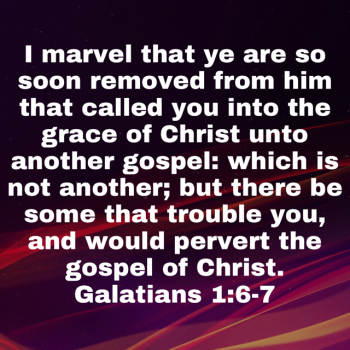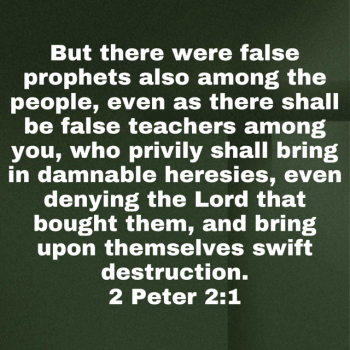Understanding an epistle depends largely on understanding both the immediate context For instance, readers of Peter's letters must first know who is Peter and why he is significant. Second, readers must identify Peter's intended audience.
1 Peter 1:
1 Peter, an apostle of Jesus Christ, to
the sojourners scattered throughout Pontus, Galatia, Cappadocia, Asia, and Bithynia,
Still speaking to the same people about
the way of life inherited from their ancestors:
18 You know that from your empty way of life inherited from your ancestors you were ransomed - not by perishable things like silver or gold,
1 Peter 2 - still speaking to the same people:
9 But ye are a chosen generation, a royal priesthood, an holy nation, a peculiar people; that ye should shew forth the praises of him who hath called you out of darkness into his marvellous light:
10
Which in time past were not a people, but are now the people of God: which had not obtained mercy, but now have obtained mercy.
Paul said to Gentiles who believe in Christ:
Ephesians 2
19 Now therefore
ye are no more strangers and foreigners, but fellowcitizens with the saints, and of the household of God;
20 And are
built upon the foundation of the apostles and prophets, Jesus Christ himself being the chief corner stone.
You are reading into 1 Peter 1:1 something that according to you all who read the scriptures can see - but actually, you are one of the very few who "sees" what you see.
At best - and even what I am about to say is a matter of reading
into the text what simply cannot be proved - at best the closest you get to Peter talking to Israel is that it could be referring to people descended from the house of Israel (the Northern kingdom) which was completely cut off by God in the 8th century B.C,
ceased being A NATION, and had not received mercy (Isaiah 7:8 & Hosea 1:6),
whose descendants intermarried with Gentiles.
But even IF it IS referring to them, then it's still NOT referring to
the Jews as you claim - because IF it's referring to Israel at all, it's referring to a very mixed Gentile / descendants of "Ephraim" group of people.
BUT Peter is writing to a people who had been
ransomed from their empty way of life inherited from their ancestors who once
"were not a people, but are now the people of God: which had not obtained mercy, but now have obtained mercy", who also he called "
a chosen generation, a royal priesthood, an holy nation, a peculiar people; that ye should shew forth the praises of him who hath called you out of darkness into his marvellous light".
It's only a case of guess-work and what you
want the scriptures to be saying that would cause you (or
any reader) to insert a reference to "scattered Jews" (or even a mixed people descended from the ten northern tribes that had been scattered in the 8th century BC)
into the text.
But you say Peter is referring to the
Jewish diaspora.
Peter: He identifies himself as an Apostle.
Audience: He writes to the Diaspora, the Jewish people living outside the country.
Larger Context: God's relationship to the nation of Israel as recorded in the Hebrew Scriptures.
Your "larger context" has nothing to do with Christ then?
While that might be true for some teachers, that isn't true in my case. My only concern is what Peter originally meant to say. Did Peter mean to speak metaphorically about the church, describing them as Christians scattered across various regions of Asia Minor? Or was Peter talking to Jewish communities living outside of Israel?
Peter was talking to people who according to the way the NetFree version puts it, were temporarily residing in the areas he mentions - Peter specifically calls them SOJOURNERS. There's nothing metaphorical about sojourners. It's a massive
assumption to say he was talking
only to the "Jewish diaspora" in the region who happened to all believe in Christ.
Peter's use of Old Testament Language to write a letter to those in his purview, i.e., the Jewish believers in Jesus Christ, is intended to bridge the gap between Jewish imagery and their new life in Christ.
No, that's not true at all. The
Hebrew scriptures were the
only scriptures that existed for the church - Jew or Gentile - at the time Peter wrote his letter. The New Testament was
still in the process of being compiled - and Peter's letter is only
one of the letters to the Christians who were SOJOURNING in the region which eventually became part of the Christian Bible Canon.
The moment
Gentiles came to faith in Christ they began to be taught about the God of Abraham, Isaac and Jacob -
from the Hebrew scriptures, and no doubt
the Septuagint was used more than anything else outside of Judea and Samaria.
Given that the Jewish people are a Holy people, then they should live as a holy people.
Same for
any people called to be holy - and your definition of "holy" has different types of holy - which is also non-biblical. Holy means "set apart unto God" and
anyone set apart unto God is supposed to live a moral lifestyle. Being set apart unto God (holy) naturally includes moral holiness.
Good. I don't believe that
you believe you speak for God. But you are talking about a portion of scripture - and any portion of scripture requires a lot more diligence and care to interpret correctly than what you seem to have allowed.
We cannot just make assumptions and then add those assumption to scripture - and you are making assumptions about this text and adding your assumptions to scripture.




